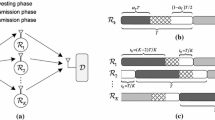Abstract
Selection cooperation is an attractive cooperative strategy for wireless networks due to its simplicity and efficiency. In this paper, we consider a heterogeneous cooperative network consisting of different kinds of nodes with low-cost radios where the activities of one kind of nodes are triggered by the other kinds of nodes. This is a common scenario for many networks, such as wireless sensor networks. By exploiting the transmission relationship between heterogeneous nodes, we propose a selection cooperation protocol where inducing nodes can cooperate with the following nodes after their own transmissions for improving the communication reliability of the latter nodes. Through performance analysis, we show an interesting feature that the diversity-multiplexing tradeoff of the proposed protocol does not rely on the best relay selection method and the protocol always achieves the full diversity gain. We further develop an energy-efficient best relay selection method based on power control where the power consumption is minimized without decreasing the full diversity order. Simulation results demonstrate the good performance of the protocol and the remarkable energy reduction of the proposed best relay selection method.





Similar content being viewed by others
References
Akyildiz, I. F., Melodia, T., & Chowdhury, K. R. (2007). A survey on wireless multimedia sensor networks. Computer Networks, 51(4), 921–960.
Amin, O., Ikki, S. S., & Uysal, M. (2011). On the performance analysis of multirelay cooperative diversity systems with channel estimation errors. IEEE Transactions on Vehicular Technology, 60(5), 2050–2059.
Azarian, K., Gamal, H. E., & Schniter, P. (2005). On the achievable diversity-multiplexing tradeoff in half-duplex cooperative channels. IEEE Transactions on Information Theory, 51(12), 4152–4172.
Beres, E., & Adve, R. (2008). Selection cooperation in multi-source cooperative networks. IEEE Transactions on Wireless Communications, 7(1), 118–127.
Bletsas, A., Khisti, A., Reed, D. P., & Lippman, A. (2006). A simple cooperative diversity method based on network path selection. IEEE Journal on Selected Areas in Communications, 24(3), 659–672.
Gedik, B., & Uysal, M. (2009). Impact of imperfect channel estimation on the performance of amplify-and-forward relaying. IEEE Transactions on Wireless Communications, 8(3), 1468–1479.
Laneman, J. N., Tse, D. N. C., & Wornell, G. W. (2004). Cooperative diversity in wireless networks: Efficient protocols and outage behavior. IEEE Transactions on Information Theory, 50(12), 3062–3080.
Laneman, J. N., & Wornell, G. W. (2003). Distributed space-time-coded protocols for exploiting cooperative diversity in wireless networks. IEEE Transactions on Information Theory, 49(10), 2415–2425.
Li, M., Yu, M., & Wang, H. (2013). A lightweight selection cooperation protocol with multiple available best relays. IEEE Communications Letters, 17(6), 1172–1175.
Liu, K. H. (2012). On the performance of time-orthogonal incremental relaying based on demodulate-and-forward with distributed channel access. IEEE Transactions on Vehicular Technology, 61(2), 737–747.
Tannious, R., & Nosratinia, A. (2008). Spectrally-efficient relay selection with limited feedback. IEEE Journal on Selected Areas in Communications, 26(8), 1419–1428.
Tourki, K., Alouini, M. S., Qaraqe, K. A., & Yang, H. C. (2013). Performance analysis of opportunistic nonregenerative relaying. Wireless Communications and Mobile Computing. doi:10.1002/wcm.2347.
Wang, H., Li, M., Lin, J., & Zhong, Y. (2012). Diversity-multiplexing-delay tradeoff in selection cooperation networks with ARQ. IEEE Transactions on Communications, 60(6), 1729–1740.
Wang, H., Yang, S., & Lin, J. (2009). A distributed selection cooperation protocol with feedback and its DMT in Nakagami-m fading channels. IEEE Communications Letters, 13(11), 844–846.
Wang, H., Yang, S., Lin, J., & Zhong, Y. (2010). Single relay selection with feedback and power allocation in multisource multidestination cooperative networks. IEEE Signal Processing Letters, 17(12), 997–1000.
Yang, C. Q., Wang, W. B., Chen, S. P., & Peng, M. G. (2013). Outage performance of orthogonal spacetime block code transmission in opportunistic decode-and-forward cooperative networks. Wireless Communications and Mobile Computing., 13(7), 700–710.
Zheng, L., & Tse, D. N. C. (2003). Diversity and multiplexing: A fundamental tradeoff in multiple-antenna channels. IEEE Transactions on Information Theory, 49(5), 1073–1096.
Zhou, Z., Zhou, S., Cui, J. H., & Cui, S. (2008). Energy-efficient cooperative communication based on power control and selective single-relay in wireless sensor networks. IEEE Transactions on Wireless Communications, 7(8), 3066–3078.
Zou, Y., Yao, Y. D., & Zheng, B. (2012). Opportunistic distributed space-time coding for decode-and-forward cooperation systems. IEEE Transactions on Signal Processing, 60(4), 1766–1781.
Acknowledgments
This work was supported by the National Natural Science Foundation of China (Grant No. 61301125), the Fundamental and Advanced Research Program of Chongqing (Grant No. cstc2013jcyjA40008), and the Foundation for University Youth Key Teacher of Chongqing.
Author information
Authors and Affiliations
Corresponding author
Rights and permissions
About this article
Cite this article
Li, M., Yu, M., Wang, H. et al. Selection Cooperation in Heterogeneous Cooperative Networks. Wireless Pers Commun 75, 2089–2102 (2014). https://doi.org/10.1007/s11277-013-1455-7
Published:
Issue Date:
DOI: https://doi.org/10.1007/s11277-013-1455-7




